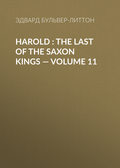
Эдвард Бульвер-Литтон
Alice, or the Mysteries — Complete
CHAPTER V
YET once more,
O ye laurels! and once more,
Ye myrtles!
—LYCIDAS.
WHILE Maltravers was yet agitated and excited by the disclosures of the curate, to whom, as a matter of course, he had divulged his own identity with the mysterious Butler, Aubrey, turning his eyes to the casement, saw the form of Lady Vargrave slowly approaching towards the house.
"Will you withdraw to the inner room?" said he; "she is coming; you are not yet prepared to meet her!—nay, would it be well?"
"Yes, yes; I am prepared. We must be alone. I will await her here."
"But—"
"Nay, I implore you!"
The curate, without another word, retired into the inner apartment, and Maltravers sinking in a chair breathlessly awaited the entrance of Lady Vargrave. He soon heard the light step without; the door, which opened at once on the old-fashioned parlour, was gently unclosed, and Lady Vargrave was in the room! In the position he had taken, only the outline of Ernest's form was seen by Alice, and the daylight came dim through the cottage casement; and seeing some one seated in the curate's accustomed chair, she could but believe that it was Aubrey himself.
"Do not let me interrupt you," said that sweet, low voice, whose music had been dumb for so many years to Maltravers, "but I have a letter from France, from a stranger. It alarms me so; it is about Evelyn;" and, as if to imply that she meditated a longer visit than ordinary, Lady Vargrave removed her bonnet, and placed it on the table. Surprised that the curate had not answered, had not come forward to welcome her, she then approached; Maltravers rose, and they stood before each other face to face. And how lovely still was Alice! lovelier he thought even than of old! And those eyes, so divinely blue, so dovelike and soft, yet with some spiritual and unfathomable mystery in their clear depth, were once more fixed upon him. Alice seemed turned to stone; she moved not, she spoke not, she scarcely breathed; she gazed spellbound, as if her senses—as if life itself—had deserted her.
"Alice!" murmured Maltravers,—"Alice, we meet at last!"
His voice restored memory, consciousness, youth, at once to her! She uttered a loud cry of unspeakable joy, of rapture! She sprang forward—reserve, fear, time, change, all forgotten; she threw herself into his arms, she clasped him to her heart again and again!—the faithful dog that has found its master expresses not his transport more uncontrollably, more wildly. It was something fearful—the excess of her ecstasy! She kissed his hands, his clothes; she laughed, she wept; and at last, as words came, she laid her head on his breast, and said passionately, "I have been true to thee! I have been true to thee!—or this hour would have killed me!" Then, as if alarmed by his silence, she looked up into his face, and as his burning tears fell upon her cheek, she said again and with more hurried vehemence, "I have been faithful,—do you not believe me?"
"I do, I do, noble, unequalled Alice! Why, why were you so long lost to me? Why now does your love so shame my own?"
At these words, Alice appeared to awaken from her first oblivion of all that had chanced since they met; she blushed deeply, and drew herself gently and bashfully from his embrace. "Ah," she said, in altered and humbled accents, "you have loved another! Perhaps you have no love left for me! Is it so; is it? No, no; those eyes—you love me—you love me still!"
And again she clung to him, as if it were heaven to believe all things, and death to doubt. Then, after a pause, she drew him gently with both her hands towards the light, and gazed upon him fondly, proudly, as if to trace, line by line, and feature by feature, the countenance which had been to her sweet thoughts as the sunlight to the flowers. "Changed, changed," she muttered; "but still the same,—still beautiful, still divine!" She stopped. A sudden thought struck her: his garments were worn and soiled by travel, and that princely crest, fallen and dejected, no longer towered in proud defiance above the sons of men. "You are not rich," she exclaimed eagerly,—"say you are not rich! I am rich enough for both; it is all yours,—all yours; I did not betray you for it; there is no shame in it. Oh, we shall be so happy! Thou art come back to thy poor Alice! thou knowest how she loved thee!"
There was in Alice's manner, her wild joy, something so different from her ordinary self, that none who could have seen her—quiet, pensive, subdued—would have fancied her the same being. All that Society and its woes had taught were gone; and Nature once more claimed her fairest child. The very years seemed to have fallen from her brow, and she looked scarcely older than when she had stood with him beneath the moonlight by the violet banks far away. Suddenly, her colour faded; the smile passed from the dimpled lips; a sad and solemn aspect succeeded to that expression of passionate joy. "Come," she said, in a whisper, "come, follow;" and still clasping his hand, she drew him to the door. Silent and wonderingly he followed her across the lawn, through the moss-grown gate, and into the lonely burial-ground. She moved on with a noiseless and gliding step,—so pale, so hushed, so breathless, that even in the noonday you might have half fancied the fair shape was not owned by earth. She paused where the yew-tree cast its gloomy shadow; and the small and tombless mound, separated from the rest, was before them. She pointed to it, and falling on her knees beside it, murmured, "Hush, it sleeps below,—thy child!" She covered her face with both her hands, and her form shook convulsively.
Beside that form and before that grave knelt Maltravers. There vanished the last remnant of his stoic pride; and there—Evelyn herself forgotten—there did he pray to Heaven for pardon to himself, and blessings on the heart he had betrayed. There solemnly did he vow, the remainder of his years, to guard from all future ill the faithful and childless mother.
CHAPTER VI
WILL Fortune never come with both hands full,
But write her fair words still in foulest letters?
Henry IV. Part ii.
I PASS over those explanations, that record of Alice's eventful history, which Maltravers learned from her own lips, to confirm and add to the narrative of the curate, the purport of which is already known to the reader.
It was many hours before Alice was sufficiently composed to remember the object for which she had sought the curate. But she had laid the letter which she had brought, and which explained all, on the table at the vicarage; and when Maltravers, having at last induced Alice, who seemed afraid to lose sight of him for an instant, to retire to her room, and seek some short repose, returned towards the vicarage, he met Aubrey in the garden. The old man had taken the friend's acknowledged license to read the letter evidently meant for his eye; and, alarmed and anxious, he now eagerly sought a consultation with Maltravers. The letter, written in English, as familiar to the writer as her own tongue, was from Madame de Ventadour. It had been evidently dictated by the kindest feelings. After apologizing briefly for her interference, she stated that Lord Vargrave's marriage with Miss Cameron was now a matter of public notoriety; that it would take place in a few days; that it was observed with suspicion that Miss Cameron appeared nowhere; that she seemed almost a prisoner in her room; that certain expressions which had dropped from Lady Doltimore had alarmed her greatly. According to these expressions, it would seem that Lady Vargrave was not apprised of the approaching event; that, considering Miss Cameron's recent engagement to Mr. Maltravers suddenly (and, as Valerie thought, unaccountably) broken off on the arrival of Lord Vargrave; considering her extreme youth, her brilliant fortune; and, Madame de Ventadour delicately hinted, considering also Lord Vargrave's character for unscrupulous determination in the furtherance of any object on which he was bent,—considering all this, Madame de Ventadour had ventured to address Miss Cameron's mother, and to guard her against the possibility of design or deceit. Her best apology for her intrusion must be her deep interest in Miss Cameron, and her long friendship for one to whom Miss Cameron had been so lately betrothed. If Lady Vargrave were aware of the new engagement, and had sanctioned it, of course her intrusion was unseasonable and superfluous; but if ascribed to its real motive, would not be the less forgiven.
It was easy for Maltravers to see in this letter how generous and zealous had been that friendship for himself which could have induced the woman of the world to undertake so officious a task. But of this he thought not, as he hurried over the lines, and shuddered at Evelyn's urgent danger.
"This intelligence," said Aubrey, "must be, indeed, a surprise to Lady Vargrave. For we have not heard a word from Evelyn or Lord Vargrave to announce such a marriage; and she (and myself till this day) believed that the engagement between Evelyn and Mr. ——-, I mean," said Aubrey with confusion,—"I mean yourself, was still in force. Lord Vargrave's villany is apparent; we must act immediately. What is to be done?"
"I will return to Paris to-morrow; I will defeat his machination, expose his falsehood!"
"You may need a proxy for Lady Vargrave, an authority for Evelyn; one whom Lord Vargrave knows to possess the secret of her birth, her rights: I will go with you. We must speak to Lady Vargrave."
Maltravers turned sharply round. "And Alice knows not who I am; that I—I am, or was, a few weeks ago, the suitor of another; and that other the child she has reared as her own! Unhappy Alice! in the very hour of her joy at my return, is she to writhe beneath this new affliction?"
"Shall I break it to her?" said Aubrey, pityingly.
"No, no; these lips must inflict the last wrong!" Maltravers walked away, and the curate saw him no more till night.
In the interval, and late in the evening, Maltravers rejoined Alice.
The fire burned clear on the hearth, the curtains were drawn, the pleasant but simple drawing-room of the cottage smiled its welcome as Maltravers entered, and Alice sprang up to greet him! It was as if the old days of the music-lesson and the meerschaum had come back.
"This is yours," said Alice, tenderly, as he looked round the apartment. "Now—now I know what a blessed thing riches are! Ah, you are looking on that picture; it is of her who supplied your daughter's place,—she is so beautiful, so good, you will love her as a daughter. Oh, that letter—that—that letter—I forgot it till now—it is at the vicarage—I must go there immediately, and you will come too,—you will advise us."
"Alice, I have read the letter,—I know all. Alice, sit down and hear me,—it is you who have to learn from me. In our young days I was accustomed to tell you stories in winter nights like these,—stories of love like our own, of sorrows which, at that time, we only knew by hearsay. I have one now for your ear, truer and sadder than they were. Two children, for they were then little more—children in ignorance of the world, children in freshness of heart, children almost in years—were thrown together by strange vicissitudes, more than eighteen years ago. They were of different sexes,—they loved and they erred. But the error was solely with the boy; for what was innocence in her was but passion in him. He loved her dearly; but at that age her qualities were half developed. He knew her beautiful, simple, tender; but he knew not all the virtue, the faith, and the nobleness that Heaven had planted in her soul. They parted,—they knew not each other's fate. He sought her anxiously, but in vain; and sorrow and remorse long consumed him, and her memory threw a shadow over his existence. But again—for his love had not the exalted holiness of hers (she was true!)—he sought to renew in others the charm he had lost with her. In vain,—long, long in vain. Alice, you know to whom the tale refers. Nay, listen yet. I have heard from the old man yonder that you were witness to a scene many years ago which deceived you into the belief that you beheld a rival. It was not so: that lady yet lives,—then, as now, a friend to me; nothing more. I grant that, at one time, my fancy allured me to her, but my heart was still true to thee."
"Bless you for those words!" murmured Alice; and she crept more closely to him.
He went on. "Circumstances, which at some calmer occasion you shall hear, again nearly connected my fate by marriage to another. I had then seen you at a distance, unseen by you,—seen you apparently surrounded by respectability and opulence; and I blessed Heaven that your lot, at least, was not that of penury and want." (Here Maltravers related where he had caught that brief glimpse of Alice,34—how he had sought for her again and again in vain.) "From that hour," he continued, "seeing you in circumstances of which I could not have dared to dream, I felt more reconciled to the past; yet, when on the verge of marriage with another—beautiful, gifted, generous as she was—a thought, a memory half acknowledged, dimly traced, chained back my sentiments; and admiration, esteem, and gratitude were not love! Death—a death melancholy and tragic—forbade this union; and I went forth in the world, a pilgrim and a wanderer. Years rolled away, and I thought I had conquered the desire for love,—a desire that had haunted me since I lost thee. But, suddenly and recently, a being, beautiful as yourself—sweet, guileless, and young as you were when we met—woke in me a new and a strange sentiment. I will not conceal it from you: Alice, at last I loved another! Yet, singular as it may seem to you, it was a certain resemblance to yourself, not in feature, but in the tones of the voice, the nameless grace of gesture and manner, the very music of your once happy laugh,—those traits of resemblance which I can now account for, and which children catch not from their parents only, but from those they most see, and, loving most, most imitate in their tender years,—all these, I say, made perhaps a chief attraction, that drew me towards—Alice, are you prepared for it?—drew me towards Evelyn Cameron. Know me in my real character, by my true name: I am that Maltravers to whom the hand of Evelyn was a few weeks ago betrothed!"
He paused, and ventured to look up at Alice; she was exceedingly pale, and her hands were tightly clasped together, but she neither wept nor spoke. The worst was over; he continued more rapidly, and with less constrained an effort: "By the art, the duplicity, the falsehood of Lord Vargrave, I was taught in a sudden hour to believe that Evelyn was our daughter, that you recoiled from the prospect of beholding once more the author of so many miseries. I need not tell you, Alice, of the horror that succeeded to love. I pass over the tortures I endured. By a train of incidents to be related to you hereafter, I was led to suspect the truth of Vargrave's tale. I came hither; I have learned all from Aubrey. I regret no more the falsehood that so racked me for the time; I regret no more the rupture of my bond with Evelyn; I regret nothing that brings me at last free and unshackled to thy feet, and acquaints me with thy sublime faith and ineffable love. Here then—here beneath your own roof—here he, at once your earliest friend and foe, kneels to you for pardon and for hope! He woos you as his wife, his companion to the grave! Forget all his errors, and be to him, under a holier name, all that you were to him of old!"
"And you are then Evelyn's suitor,—you are he whom she loves? I see it all—all!" Alice rose, and, before he was even aware of her purpose, or conscious of what she felt, she had vanished from the room.
Long, and with the bitterest feelings, he awaited her return; she came not. At last he wrote a hurried note, imploring her to join him again, to relieve his suspense; to believe his sincerity; to accept his vows. He sent it to her own room, to which she had hastened to bury her emotions. In a few minutes there came to him this answer, written in pencil, blotted with tears.
"I thank you, I understand your heart; but forgive me—I cannot see you yet. She is so beautiful and good, she is worthy of you. I shall soon be reconciled. God bless you,—bless you both!"
The door of the vicarage was opened abruptly, and Maltravers entered with a hasty but heavy tread.
"Go to her, go to that angel; go, I beseech you! Tell her that she wrongs me, if she thinks I can ever wed another, ever have an object in life, but to atone to, to merit her. Go, plead for me."
Aubrey, who soon gathered from Maltravers what had passed, departed to the cottage. It was near midnight before he returned. Maltravers met him in the churchyard, beside the yew-tree. "Well, well, what message do you bring?"
"She wishes that we should both set off for Paris to-morrow. Not a day is to be lost,—we must save Evelyn from this snare."
"Evelyn! Yes, Evelyn shall be saved; but the rest—the rest—why do you turn away?"
"'You are not the poor artist, the wandering adventurer; you are the high-born, the wealthy, the renowned Maltravers: Alice has nothing to confer on you. You have won the love of Evelyn,—Alice cannot doom the child confided to her care to hopeless affection; you love Evelyn,—Alice cannot compare herself to the young and educated and beautiful creature, whose love is a priceless treasure. Alice prays you not to grieve for her; she will soon be content and happy in your happiness.' This is the message."
"And what said you,—did you not tell her such words would break my heart?"
"No matter what I said; I mistrust myself when I advise her. Her feelings are truer than all our wisdom!"
Maltravers made no answer, and the curate saw him gliding rapidly away by the starlit graves towards the village.
CHAPTER VII
THINK you I can a resolution fetch
From flowery tenderness?
—Measure for Measure.
THEY were on the road to Dover. Maltravers leaned back in the corner of the carriage with his hat over his brows, though the morning was yet too dark for the curate to perceive more than the outline of his features. Milestone after milestone glided by the wheels, and neither of the travellers broke the silence. It was a cold, raw morning, and the mists rose sullenly from the dank hedges and comfortless fields.
Stern and self-accusing was the scrutiny of Maltravers into the recesses of his conscience, and the blotted pages of the Past. That pale and solitary mother, mourning over the grave of her—of his own—child, rose again before his eyes, and seemed silently to ask him for an account of the heart he had made barren, and of the youth to which his love had brought the joylessness of age. With the image of Alice,—afar, alone, whether in her wanderings, a beggar and an outcast, or in that hollow prosperity, in which the very ease of the frame allowed more leisure to the pinings of the heart,—with that image, pure, sorrowing, and faithful from first to last, he compared his own wild and wasted youth, his resort to fancy and to passion for excitement. He contrasted with her patient resignation his own arrogant rebellion against the trials, the bitterness of which his proud spirit had exaggerated; his contempt for the pursuits and aims of others; the imperious indolence of his later life, and his forgetfulness of the duties which Providence had fitted him to discharge. His mind, once so rudely hurled from that complacent pedestal, from which it had so long looked down on men, and said, "I am wiser and better than you," became even too acutely sensitive to its own infirmities; and that desire for Virtue, which he had ever deeply entertained, made itself more distinctly and loudly heard amidst the ruins and the silence of his pride.
From the contemplation of the Past, he roused himself to face the Future. Alice had refused his hand, Alice herself had ratified and blessed his union with another! Evelyn, so madly loved,—Evelyn might still be his! No law—from the violation of which, even in thought, Human Nature recoils appalled and horror-stricken—forbade him to reclaim her hand, to snatch her from the grasp of Vargrave, to woo again, and again to win her! But did Maltravers welcome, did he embrace that thought? Let us do him justice: he did not. He felt that Alice's resolution, in the first hour of mortified affection, was not to be considered final; and even if it were so, he felt yet more deeply that her love—the love that had withstood so many trials—never could be subdued. Was he to make her nobleness a curse? Was he to say, "Thou hast passed away in thy generation, and I leave thee again to thy solitude for her whom thou hast cherished as a child?" He started in dismay from the thought of this new and last blow upon the shattered spirit; and then fresh and equally sacred obstacles between Evelyn and himself broke slowly on his view. Could Templeton rise from his grave, with what resentment, with what just repugnance, would he have regarded in the betrayer of his wife (even though wife but in name) the suitor to his child!
These thoughts came in fast and fearful force upon Maltravers, and served to strengthen his honour and his conscience. He felt that though, in law, there was no shadow of connection between Evelyn and himself, yet his tie with Alice had been of a nature that ought to separate him from one who had regarded Alice as a mother. The load of horror, the agony of shame, were indeed gone; but still a voice whispered as before, "Evelyn is lost to thee forever!" But so shaken had already been her image in the late storms and convulsion of his soul, that this thought was preferable to the thought of sacrificing Alice. If that were all—but Evelyn might still love him; and justice to Alice might be misery to her! He started from his revery with a vehement gesture, and groaned audibly.
The curate turned to address to him some words of inquiry and surprise; but the words were unheard, and he perceived, by the advancing daylight, that the countenance of Maltravers was that of a man utterly rapt and absorbed by some mastering and irresistible thought. Wisely, therefore, he left his companion in peace, and returned to his own anxious and engrossing meditations.
The travellers did not rest till they arrived at Dover. The vessel started early the following morning, and Aubrey, who was much fatigued, retired to rest. Maltravers glanced at the clock upon the mantelpiece; it was the hour of nine. For him there was no hope of sleep; and the prospect of the slow night was that of dreary suspense and torturing self-commune.
As he turned restlessly in his seat, the waiter entered to say that there was a gentleman who had caught a glimpse of him below on his arrival, and who was anxious to speak with him. Before Maltravers could answer, the gentleman himself entered, and Maltravers recognized Legard.
"I beg your pardon," said the latter, in a tone of great agitation, "but I was most anxious to see you for a few moments. I have just returned to England—all places alike hateful to me! I read in the papers—an—an announcement—which—which occasions me the greatest—I know not what I would say,—but is it true? Read this paragraph;" and Legard placed "The Courier" before Maltravers.
The passage was as follows:
"It is whispered that Lord Vargrave, who is now at Paris, is to be married in a few days to the beautiful and wealthy Miss Cameron, to whom he has been long engaged."
"Is it possible?" exclaimed Legard, following the eyes of Maltravers, as he glanced over the paragraph. "Were not you the lover,—the accepted, the happy lover of Miss Cameron? Speak, tell me, I implore you!—that it was for you, who saved my life and redeemed my honour, and not for that cold schemer, that I renounced all my hopes of earthly happiness, and surrendered the dream of winning the heart and hand of the only woman I ever loved!"
A deep shade fell over the features of Maltravers. He gazed earnestly and long upon the working countenance of Legard, and said, after a pause,—
"You, too, loved her, then? I never knew it,—never guessed it; or, if once I suspected, it was but for a moment; and—"
"Yes," interrupted Legard, passionately, "Heaven is my witness how fervently and truly I did love—I do still love Evelyn Cameron! But when you confessed to me your affection—your hopes—I felt all that I owed you; I felt that I never ought to become your rival. I left Paris abruptly. What I have suffered I will not say; but it was some comfort to think that I had acted as became one who owed you a debt never to be cancelled nor repaid. I travelled from place to place, each equally hateful and wearisome; at last, I scarce know why, I returned to England. I have arrived this day; and now—but tell me, is it true?"
"I believe it true," said Maltravers, in a hollow voice, "that Evelyn is at this moment engaged to Lord Vargrave. I believe it equally true that that engagement, founded upon false impressions, never will be fulfilled. With that hope and that belief, I am on my road to Paris."
"And she will be yours, still?" said Legard, turning away his face: "well, that I can bear. May you be happy, sir!"
"Stay, Legard," said Maltravers, in a voice of great feeling: "let us understand each other better; you have renounced your passion to your sense of honour." Maltravers paused thoughtfully. "It was noble in you, it was more than just to me; I thank you and respect you. But, Legard, was there aught in the manner, the bearing of Evelyn Cameron, that could lead you to suppose that she would have returned your affection? True, had we started on equal terms, I am not vain enough to be blind to your advantages of youth and person; but I believed that the affections of Evelyn were already mine, before we met at Paris."
"It might be so," said Legard, gloomily; "nor is it for me to say that a heart so pure and generous as Evelyn's could deceive yourself or me. Yet I had fancied, I had hoped, while you stood aloof, that the partiality with which she regarded you was that of admiration more than love; that you had dazzled her imagination rather than won her heart. I had hoped that I should win, that I was winning, my way to her affection! But let this pass; I drop the subject forever—only, Maltravers, only do me justice. You are a proud man, and your pride has often irritated and stung me, in spite of my gratitude. Be more lenient to me than you have been; think that, though I have my errors and my follies, I am still capable of some conquests over myself. And most sincerely do I now wish that Evelyn's love may be to you that blessing it would have been to me!"
This was, indeed, a new triumph over the pride of Maltravers,—a new humiliation. He had looked with a cold contempt on this man, because he affected not to be above the herd; and this man had preceded him in the very sacrifice he himself meditated.
"Legard," said Maltravers, and a faint blush overspread his face, "you rebuke me justly. I acknowledge my fault, and I ask you to forgive it. From this night, whatever happens, I shall hold it an honour to be admitted to your friendship; from this night, George Legard never shall find in me the offences of arrogance and harshness."
Legard wrung the hand held out to him warmly, but made no answer; his heart was full, and he would not trust himself to speak.
"You think, then," resumed Maltravers, in a more thoughtful tone,—"you think that Evelyn could have loved you, had my pretensions not crossed your own? And you think, also—pardon me, dear Legard—that you could have acquired the steadiness of character, the firmness of purpose, which one so fair, so young, so inexperienced and susceptible, so surrounded by a thousand temptations, would need in a guardian and protector?"
"Oh, do not judge of me by what I have been. I feel that Evelyn could have reformed errors worse than mine; that her love would have elevated dispositions yet more light and commonplace. You do not know what miracles love works! But now, what is there left for me? What matters it how frivolous and poor the occupations which can distract my thoughts, and bring me forgetfulness? Forgive me; I have no right to obtrude all this egotism on you."
"Do not despond, Legard," said Maltravers, kindly; "there may be better fortunes in store for you than you yet anticipate. I cannot say more now; but will you remain at Dover a few days longer? Within a week you shall hear from me. I will not raise hopes that it may not be mine to realize. But if it be as you think it was, why little, indeed, would rest with me. Nay, look not on me so wistfully," added Maltravers, with a mournful smile; "and let the subject close for the present. You will stay at Dover?"
"I will; but—"
"No buts, Legard; it is so settled."







